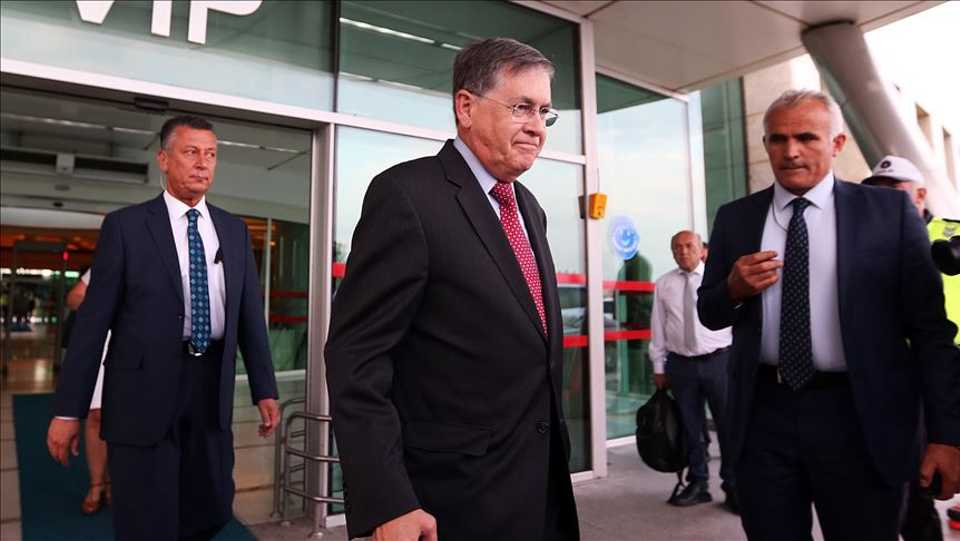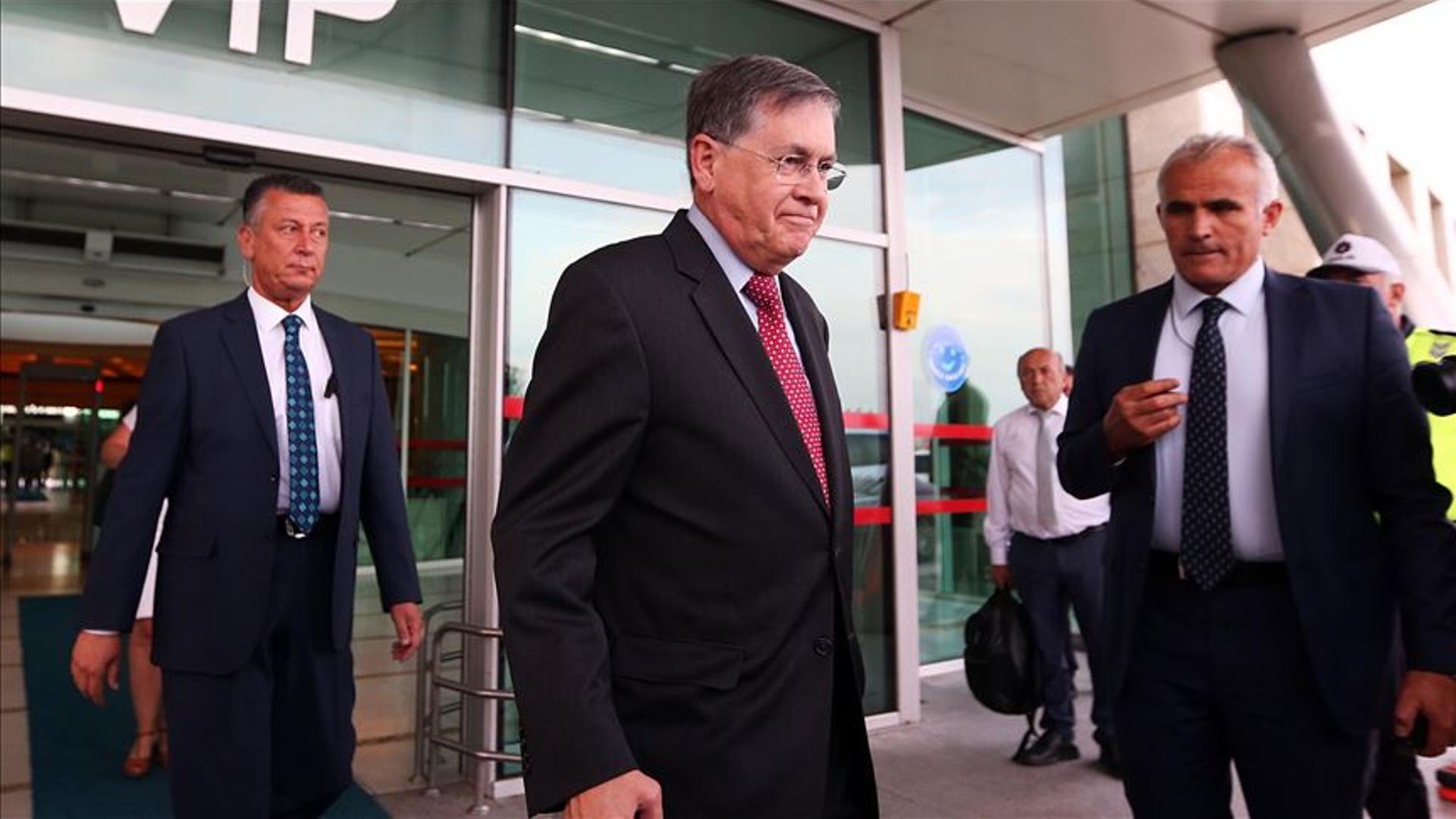
After having no ambassador in Turkey for nearly two years, the US has finally appointed David Satterfield as its envoy to Ankara.
Satterfield is a career diplomat, who led the State Department’s Near East desk. He is known for his strong views on the continuance of US military deployment in Syria, a conflicting position in light of Turkey’s support to President Donald Trump’s withdrawal decision.
When Senator Chris Murphy, Democrat of Connecticut, asked the diplomat to explain the rationale behind maintaining the US military presence in Syria after the defeat of Daesh, he pointed out Iran, expressing his discomfort with the presence of Tehran-backed militias in Syria.
“We are deeply concerned with the activities of Iran, with the ability of Iran to enhance those activities, through greater ability to move material to Syria,” Satterfield said.
“I would rather leave the discussion with that point.”
Who is David Satterfield?
Born in 1954, Satterfield stands out as a senior career diplomat of the US. Earning a bachelor’s degree from the University of Maryland in 1976, he has served as Acting Assistant Secretary of State for Near Eastern Affairs since 2017.
The American diplomat and ambassador served extensively in the Middle East, including in the Persian Gulf, Lebanon, and Iraq. During George W. Bush’s presidency, Satterfield was the coordinator for Iraq as well as becoming Senior Advisor to the Secretary of State Condoleezza Rice from 2006 to 2009.
During the presidential term of Barack Obama, Satterfield served as Director General of the Multinational Force and Observers in Rome from 2009 to 2013 and 2014 to 2017.
An expert on both linguistics and Middle East
Between 2009 and 2014, the diplomat was director general of the multinational force in the Sinai, to help maintain the Israeli-Egyptian peace agreement. He returned to the State Department in 2014 to be a special adviser on Libya.
He also assumed top posts at US missions in Syria, Saudi Arabia, Egypt and Lebanon.
Apart from English, the ambassador is fluent in Arabic, French, Italian and Hebrew.
Succeeding John Bass as ambassador to Turkey
US President Donald Trump announced Satterfield’s candidacy on February 16. The US Senate designated him on June 28.
John Bass was the last serving American ambassador to Ankara.
Bass started his term as US Ambassador to Turkey in October 2014, and he began his term during an ongoing crisis between Turkey and the US over comments from then-State Secretary John Kerry, implying that Turkey was purchasing oil from Daesh.
Upon demands from Turkey for proof of such purchases, the US admitted that there was none, apologised and retracted their statements in 2016.
Bass, who now serves as US Ambassador to Afghanistan, left Turkey in October 2017 amid a visa crisis between Washington and Ankara. He has been criticised by Turkey for several of his stances and the post has since been vacant.
Turkey and the US formed diplomatic ties in 1927 after the foundation of the Republic of Turkey in 1923.
Bulk of issues to resolve
When the US President Barack Obama departed from the White House in 2017 he left behind a bulk of unresolved issues with Turkey.
In the initial years of Syria war, Ankara and Washington were on the same page, supporting the opposition group against Bashar al Assad . But when Obama turned a blind eye to a series of chemical attacks allegedly launched by the Assad regime as well as brutal aerial bombing, which led to large-scale refugee crisis, the ties between Ankara and Washington started to come under a diplomatic strain.
Soon after Obama administration abandoned a “train and equip” agreement with Turkey, which was aimed at supporting the opposition group, and gravitated toward the YPG, a Syrian branch of PKK, an internationally recognised terrorist organisation which has waged a war against Turkey for about three decades.
During Obama’s tenure, Turkey felt it was constantly being undermined by the US, which also happens to be its NATO ally. And when Turkish democracy faced a coup attempt by Fetullah Terrorist Organization, Ankara said it provided hundreds of boxes of evidence for the extradition of the group leader Fetullah Gulen and his followers, who are taking a refuge in Pennsylvania, but Washington did not reciprocate to meet Turkish expectations.
The two countries agreed in mid-2018 on a roadmap for six months to clear Syria’s Manbij region from the YPG – which is armed and controlled by the US – and ensure the security and stability of the city. The US failed to take the group out of the region.
At the time, Satterfield said that the US should ensure that YPG will not come to harm when American soldiers will depart from Syria.
Turkey hosts the NATO Allied Land Command in Izmir, serves as one of the four framework nations for Operation Resolute Support in Afghanistan, fills the deputy commander position in NATO’s new training mission in Iraq and opened its air bases to support the anti-Daesh coalition forces.
Another issue that deepened the mistrust between the two countries is Turkey’s procurement of Russian air shield S-400 missiles. Washington threatened Ankara with economic sanctions if the missile defence system was bought from Moscow, and warned its estranged strategic ally against compromising NATO’s security, including American made F-35 jet codes, by exposing them to Moscow’s sophisticated hardware system.
In a joint press briefing with Erdogan, US President Donald Trump admitted that Ankara “was not allowed to buy Patriot missiles (American made defence missile systems) by the Obama administration,” while his administration is looking at different solutions regarding its purchase of Russia’s S-400 missiles.
Satterfield complements that line of thought. During his testimony to the Senate Foreign Relations Committee, he said efforts will be made to “press Turkey to make the right strategic choice by procuring NATO interoperable military equipment.”
Israel lobby controversy
In 2005, the New York Times described Satterfield as one of the anonymous government officials in the Baghdad Embassy cited in an August 4 indictment, for ‘providing classified information’ to an employee of a pro-Israeli group.
The Council on American-Islamic Relations (Cair) reported that the Bush administration promoted Satterfield, despite being an alleged informant for a former American Israel Public Affairs Committee (AIPAC) lobbyist Steven J. Rosen, who was facing trial in a classified information case.
Satterfield reportedly met Rosen in 2002, when Satterfield was second in command at the State Department’s Near East desk.
Prosecutors refuse to explain why Satterfield escaped prosecution for leaking information.
Defending shady war firm Blackwater
In 2007, Satterfield was also dragged into a Congressional hearing, in which Erik Prince, former US soldier and CEO of controversial security firm Blackwater, an armed group described as ‘mercenaries’, was questioned over the killing of dozens of Iraqi civilians allegedly by the members of his company.
Satterfield testified in the Congressional committee, defending Prince’s firm.
“Without private security details, we would not be able to interface with Iraqi government officials, institutions and other Iraqi civilians critical to our mission there,” said Satterfield, who was at the time the State Department’s coordinator for Iraq and a senior adviser to Secretary of State Condoleezza Rice.
Arab force against Hezbollah
In 2010, Satterfield’s name emerged in the news media after Wikileaks revealed the seasoned diplomat had a meeting with then Saudi Foreign Minister Prince Saud al Faisal, who proposed an Arab force to be formed and backed by the US to “destroy Hezbollah” in Lebanon.
Although Satterfield urged caution, saying such a military move would be open to question, he reportedly said the “US would study any Arab decision”.










Discussion about this post